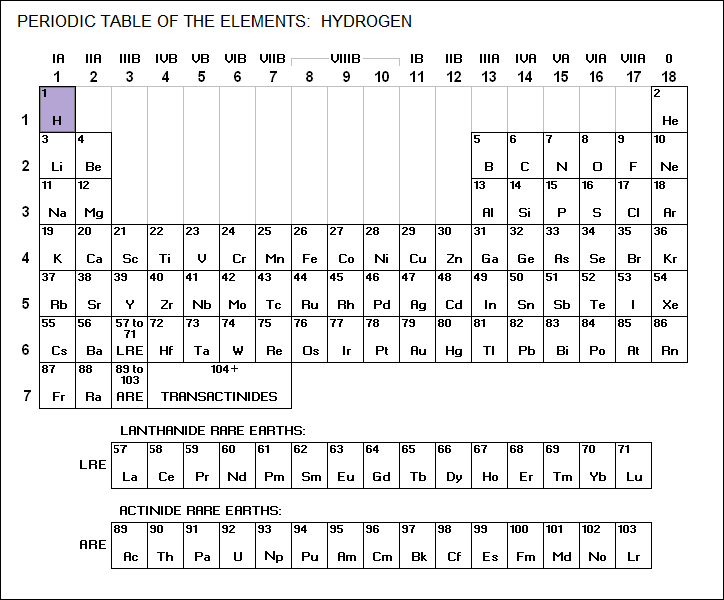
* Hydrogen is something of a unique element, forming its own domain of one element in the periodic table, and almost literally amounting to the basic building block of the cosmos. The creation of the Universe in the primordial "Big Bang" some 13.7 billion years ago resulted in a mix of about 75% hydrogen, 25% helium, and small traces of slightly heavier elements. Heavier elements up to iron were then gradually "cooked" in nuclear fusion reactions in the cores of stars; the largest stars underwent supernova explosions that produced still heavier elements. However, even today the Universe is still mostly hydrogen and helium.

____________________________________________________________________
HYDROGEN / H / 1
Elemental hydrogen occurs as H2, a colorless, odorless gas that
tends to the explosively reactive in combination with atmospheric
oxygen. The primary isotope is H<1/1> (99.9%); the remainder is
H<2/1> or deuterium, plus some transient amounts of moderately
radioactive H<3/1> or tritium, with a half-life of 12.5 years.
atomic weight: 1.007
abundance: 10th
density of H2: 0.09 gm/l
melting point: -259 C
boiling point: -253 C
valence: 1
____________________________________________________________________
Hydrogen is fairly reactive, and in nature it is rarely found in its pure atomic form, instead forming the diatomic H2 molecule. Even free H2 gas is unusual, since any small spark in the air will cause it to combine explosively with oxygen to form water. Electrolysis can be used to separate water back into hydrogen and oxygen:
2H2O --electricity--> 2H2 + O2
Chemists used to obtain hydrogen by reacting an acid, such as hydrochloric acid (HCl), with a metal, such as zinc:
Zn + 2HCl ---> ZnCl2 + H2
Hydrogen gas is also light, and that which doesn't end up combining with oxygen to form water (H2O) tends to evaporate from the upper atmosphere into space and be lost. That is why hydrogen is only 10th in abundance on the Earth, even though the bulk of the Universe is made up of hydrogen. Most of the hydrogen on Earth is locked up in water. Of course, there are vast numbers of compounds besides water that incorporate hydrogen. Hydrogen is often used as a chemical feedstock in the synthesis of ammonia (NH3), explosives, and fertilizers. Electrolysis is too expensive at present to be used to produce hydrogen in bulk, so industrial stocks are usually made by decomposing methane (CH4) with high-temperature steam. Work is being done on improved catalysts and other technologies to make electrolysis, driven by renewable energy, a practical source of hydrogen. Discoveries of underground deposits of hydrogen, it seems produced by chemical reactions with iron-rich rock, suggests that drilling for hydrogen could become a big business, but it's not certain yet that it's practical to extract hydrogen from the ground.
Hydrogen gas was once popularly used in balloons and other lighter-than-air craft. It has the best "lifting power" of any gas, but it is too explosive, and so it is no longer generally used in such applications. Liquid H2 (LH2) is used in some space launch vehicles as a propellant, burned with liquid oxygen (LOX). LOX-LH2 propulsion is very efficient in itself, but building a rocket that burns such propellants is tricky, since LOX has a much higher boiling point (-183 C) than LH2 (-253 C): the LOX tends to heat up the LH2 and make it boil, while the LH2 tends to chill the LOX and cause it to freeze. Initial attempts to build rockets powered by LOX-LH2 were characterized by launch failures whose videos are spectacular to watch. Hydrogen is also being considered as a potential fuel for ground and air vehicles, but its production, distribution, and storage present obstacles.
